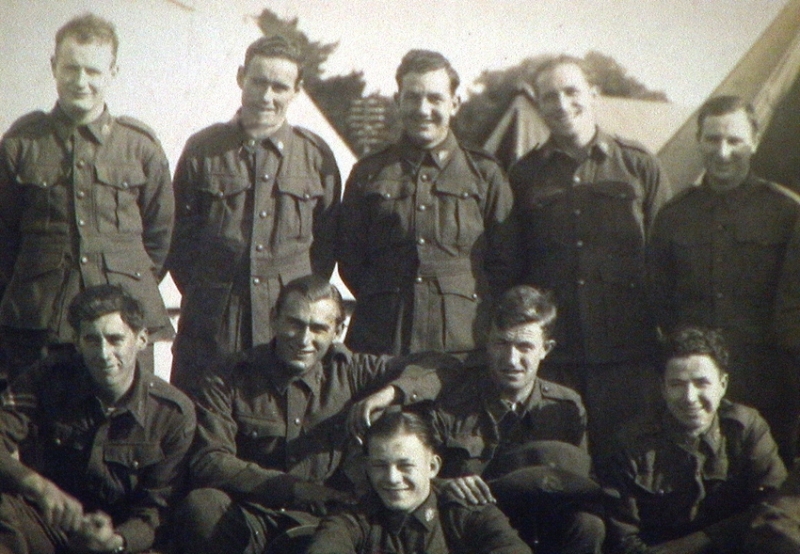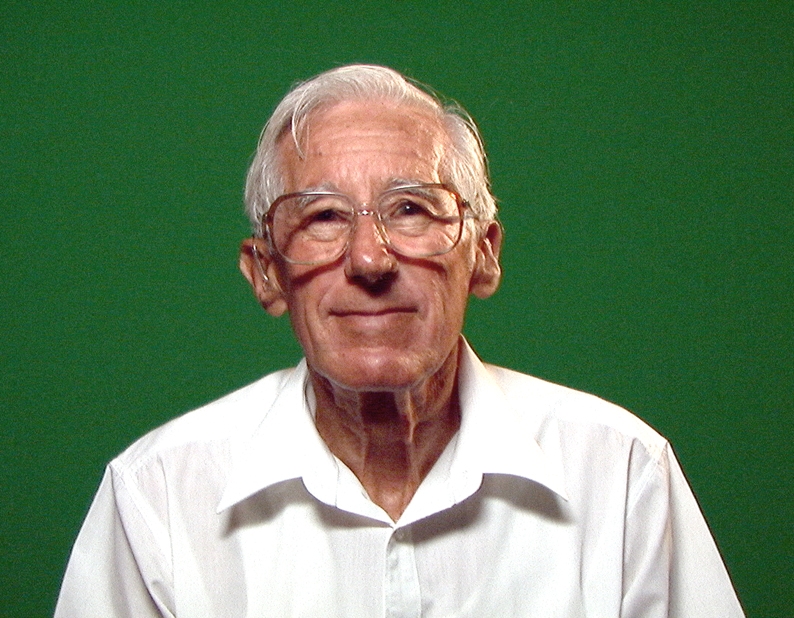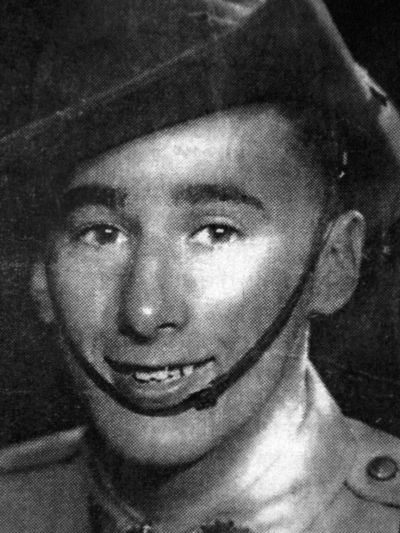Sergeant William (Bill) Guest
Bill Guest in his own words:
I was born at St Kilda in Melbourne on the 24 January 1921. My father went through the First World War, landed at Gallipoli and went through that campaign, then later went to France and he was gassed on the Somme and wounded at Passchendaele and he came back to Australia. My mother was a Tasmanian girl and he met her I think in 1919 or 1920.
I was the first one to appear on the 24th January and then later on my sister, who was eighteen months younger than me, and my brother Bob who is in Sydney is three and a half years younger. We had three children in the family and strangely enough the three of us are still alive. My early childhood, and it was the Depression days and things weren’t plentiful.
My father, when he first started off after the First World War, he went to work for a government sculptor and his name was Web Gilbert, in Canberra you have ‘Mont St. Quentin’, ‘Over the Top’ and these famous sculptures from the First World War. They called my father Abdul and the reason he got that name was on Gallipoli and he was a signaller and he was up a tree and a patrol came along and grabbed him and because he was very, very dark they reckoned he was a Turkish spy. It took some talking and getting through on a field telephone to ascertain that he wasn’t a Turkish spy, but a member of the Australian forces, and the name Abdul has stuck with him ever since.
He was always a military man and always in the militia, went away with the 2nd AIF [Australian Imperial Force] on the first day again, even though he had all those things the first time. He went away to the Middle-East with the 2/5th and everybody knew Abdul. After he left Web Gilbert, he was the model, have you been to Melbourne, do you know St Paul’s Cathedral? Outside St Paul’s Cathedral was a statue of Flinders standing in a boat and on either side of him was a seaman pushing the boat, Abdul modelled for the seaman, he couldn’t do Flinders because he was too big in stature. After he left Web Gilbert’s he went on the old cable trams in Melbourne and he became well known throughout Melbourne because the driver used to play tunes on his bell.
We grew up in Brunswick, a suburb in Melbourne, we rented houses in those days, twelve and six a week, fifteen bob and we shifted about four times because two and six meant a lot to the family for rent. I went to school at Moreland State School, which Moreland isn’t far away but it’s a fair walk but in those days you didn’t think twice about walking long distances to school.
At the age of fifteen I had to leave school to go to work. First of all I went to a timber mill in Brunswick as a clerk and I didn’t stay there all that long. Then I went to a place called the Liverpool Electric Cable Company at 586 Bourke Street Melbourne, which doesn’t exist now because there is one gigantic car park there. They were a English company and they stopped winding wires and cables coming out from England because in Australia it wasn’t being produced so in Liverpool in Sydney they put a factory and started to make their own. But in those days, and I’m talking about 1936 mark, it all came from England and I started off as a messenger boy, then I graduated onto the counter.
My father, he was never without any sort of army setup so he was in the Victorian Scottish Regiment and that’s his kilts up there, that’s what he wore, the kilts and sporran and all that sort of stuff. That was the pre-war militia. I can never forget, I couldn’t wait until I got old enough to join it. In those days they had one night of the week which was drill night and he would go to drill that night, go to the Scottish one on a Wednesday night down in South Melbourne.

When it was over they’d all go into the sergeants’ mess and drink beer, then he’d come home whistling up the sideway and we’d say, “There’s his guilty whistle.” That’s all past. When I was sixteen, one night he said, “I’m going to take you tonight to the 3rd Div Sigs in Carlton,” and he said, “Do you want to come down with me?” and I said, “Yes.” I went down with him and they had their parade and they all adjourned to the sergeants’ mess. The RSM [Regimental Sergeant Major] was there, and Abdul, and they were all drinking beer and I was sitting there drinking what they called a ‘Barmaid’s Blush’ in those days, which was lemonade and raspberry.
The cadets were going into camp at Broadmeadows on the Saturday. This RSM said, “Bill, we could sign you up,” and I said, “No, I have to wait until I am sixteen.” He said, “We can sign you up for the cadets, and do you want to go into the camp with them on Saturday?” This was about half past nine at night and all the beer was flying and they were having the time of their lives. I said, “Very good,” and I said, I’m not sixteen just yet,” and he said, “We can arrange that.”
Into the Q Store [Quartermaster’s store], I was issued with the long puttees, which were the riding boots in those days, and a hat and rifle and kitbag. Abdul and I got into the taxi and we headed home to Brunswick. As we went to go into the front door my mother appeared and she looked at me with all my regalia and she said, “What’s this?” and then she said to my father, “You haven’t got him in have you?” The next morning at nine o’clock a taxi pulled up outside our house in Brunswick, my mother loaded me and all my equipment into it and took me back to where I got it and I was out of the army. So first attempt in the army was from half past ten one night to nine in the morning and I was out, that was the cadets.

When I became seventeen I became a cadet in the Royal Melbourne Regiment, which was headquarters for the 6th Battalion which is in Victoria Street in Melbourne. In those days in the militia you did night drills and ours was Monday night and then you’d do a weekend bivouac at Broadmeadows and at the present moment you couldn’t even see a blade of grass 09:00 in Broadmeadows but then it was wide open, and there would be an annual camp, that was what the militia was. In the meantime I was still working at the Liverpool Cable Company and did this part time training as a cadet. When I was eighteen in 1939 I became a fully blown private from cadets into the militia itself.
At that time the war had broken out, we all went to camp at Mount Martha which is out of Frankston and we had to build Mount Martha first of all, we had to clear the ground and make the camp, all the young people. My father went across the road to the Victorian Scottish and I was on this side with the Royal Melbourne. This particular day, and it was 1940 and we were both still in camp because we had both been called up for full time duty, this fellow came down to me and said, “Bill, your father wants you up on the road.”
There was a road that separated the Victorian Scottish and Royal Melbourne and it was called Mount Martha Road. I went up there and here was this vehicle, a utility truck. The officer turned out to be a Colonel Cook who was sitting in the front with the driver and these five or six sergeants in the back. Abdul was one of them and he was a signalling sergeant and he said to me, “Son, you are going home on leave at the weekend?” and I said, “Yes, where are you going?” He said, “We are going into Melbourne to join up in the AIF.” I remember I said to him, “They can’t take you.” He said, “Well I’m going,” and he said, “When you go home at the weekend you can tell your mother,” and I wasn’t looking forward to doing this at all.
Away goes the Victorian Scottish Regiment to join the 2/5th Battalion to go away and fight and I went back to the lines. When I went home on the Saturday I didn’t know how to tell my mother. We were all sitting down to tea and she said, “I wonder where your father is. He said he was coming home this weekend and he is always home by now.” I said, “Well mother, it’s like this, he won’t be here,” and she said, “What do you mean?” and then I had to tell her. I said, “He’s joined the AIF and he’s in Puckapunyal.”
Then she started. Then she said, “Gassed, he got a shrapnel in the wrist.” To cut a long story short Abdul went across to the Middle-East and I went back
to Mount Martha on full-time duties. I became a corporal and then a land sergeant. The camp had finished at Mount Martha and this would about February 1941 and we had to go up to Balcombe which was the
camp on top. In those days instead of it being a regular army it was a permanent army.
A permanent army consists mainly of warrant officers, very rigid old soldiers who were strict to the letter of the law. When we got up there, this fellow’s name was Ken Raid and he wasn’t a RSM but he was attached to the Royal Melbourne as warrant officer instructor, that was his job. The only
NCOs [Non Commissioned Officers] are only corporals and sergeants, and all the privates were marched out of camp and we went up to Balcombe. When we got up there, there was a small hut there and Warrant Officer Ken Raid said, “Inside that hut is a prisoner and his name is McDonald and he’s on
a charge and he is going to go before the colonel.” He said to me, “You will be the sergeant of the guard, I am going to make the corporals members because we don’t have any private soldiers.”
There were two of them, one was named Holiday and the other one was Johnson. They became the guards on the hut and I was the sergeant. We didn’t like this at all because we thought we were in the army for other reasons, other than guarding somebody in a hut. Ken Raid disappeared for a while and
then came back and he said to me, “I want to talk to the prisoner.” I said, “Okay,” and Holiday and Johnson were standing each side and they opened the door and this McDonald stepped forward and stood in front of Ken Raid. Ken Raid said to him, “Why did you go AWL [Absent Without Leave]?” and McDonald said, “Because I heard the news that my wife was messing around with a Yank,” that’s the words that he said. Then Ken Raid said, “That will teach you to pick your women better in future.” As he said that, McDonald went forward and Holiday and Johnson grabbed him by the arms and pulled him back and his right foot shot out and completely missed Ken Raid by about a foot. Ken Raid grabbed his stomach and staggered back and said, “He kicked me.” This happened.
The next morning was the court martial and they brought McDonald up, and the colonel, first of all he asked Corporal Taverner, “Tell me the story Corporal Taverner.” and Corporal Taverner explained exactly what had happened and he, Colonel, said, “In your opinion, did the foot of the accused make contact with Ken Raid in any way?” He said, “No sir,” and Johnson said the same. “And Sergeant Guest, your version?” I said, “My version is the same.” So the colonel dismissed the charge of attempting to kick Ken Raid. McDonald went back in the hut because he was on a charge of being AWL anyway. Shortly after that had happened, Ken Raid came up to me and said, “I will suggest that you get out of the real regiment very, very quickly,” and I thought, “Good God, what if I don’t?” The next day we went back to Mount Martha and outside the company headquarters was a big sign on the board: ‘Volunteers wanted for 39th Battalion, NCOs and other ranks’.

Bill Guest
Sergeant William (Bill) Guest, 'A' Company, 39th Infantry Battalion, sailed on the Aquitania to Papua New Guinea and landed at Port Moresby on 3 January 1942. The men in 'A' Company trekked over the Owen Stanley Range and Bill took over the role of platoon commander when his senior officer contracted malaria. 'A' Company reoccupied Kokoda on 8 August 1942 but, outnumbered by the enemy and with no hope of resupply, they were forced to pull out on 10 August. Although the main group retreated quickly to Deniki, Bill Guest was responsible for getting the wounded to safety. He and his party of 21 men spent 6 days trekking through the jungle with no food and finally rejoined their battalion at Isurava. The men were sick and weak but fought on when the Japanese launched a full-scale attack on 27 August 1942. The 39th was saved from annihilation by the arrival of the 2/14th Infantry Battalion who fought alongside them, eventually relieving them so they could return to Port Moresby.
After Kokoda Bill Guest went with his platoon to Gona where he took part in the Beachheads battles. Bill contracted malaria and dengue fever and spent much of 1943 in hospital in Australia. In 1945 he served at Balikpapan in Borneo with the 2/10th Infantry Battalion.

B Ill Guest 1941
